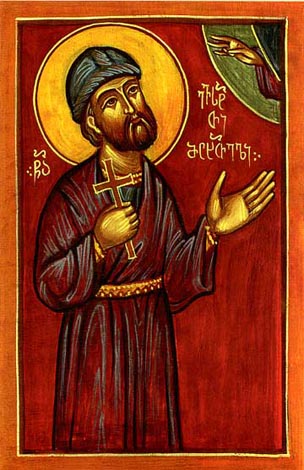
The Holy Martyr Eustathios of Mtskheta
Commemorated on July 29
The Holy Martyr
Eustathios of Mtskheta was descended from a long line of Persian
fire-worshipping pagan priests, and prior to Baptism he had the name
Bgrobandaves. His father and brothers, serving in the Zoroastrian cult,
attempted to make a pagan priest of Bgrobandaves, but in vain. During the reign
of the Gruzian (Georgian) emperor Guram Kuropalat (575-600), at age 30 he resettled
from the Persian village of Arbuketi (near the city of Gandrakili) to the
ancient capital of Gruzia, the city Mtskheta. He earned the means of his
livelihood in the sandal trade. Saint Eustathios began often to visit the
Mtskheta cathedral, where the Christian Divine-services filled his soul with an
inexorable delight. Archdeacon Samuel (the future Katholikos-Archbishop Samuel
IV, 582-591), having noticed the spiritual proclivity of the Persian pagan,
spoke with him about the Christian teachings. Having then come to believe in
Christ, Bgrobandaves accepted to be a catechumen under Archdeacon Samuel, and
after a certain while, when Samuel became Katholikos, he accepted Baptism under
him with the name Eustathios. Eustathios then married a Christian wife, and led
a pious life, abundant in virtue.
Fellow Persians,
living also at Mtskheta, were unable to sway Saint Eustathios into a return to
fire-worship, and so they persuaded the Persian head of the city to have him
sent to Tbilisi to Arvand-Gubnav, satrap (vicar) of the Persian shah Chosroes
Nushirvanes. Dispatched to trial under the satrap together with Saint
Eustathios were likewise other Persians, who had accepted Christianity: Gubnak,
Bagdad, Panaguznas, Perozav, Zarmi and Stephen. Two of these, Bagdad and
Panaguznas, under the fear of death, renounced Christ.

Saint Eustathios and
the remaining confessors honourably underwent a six-month imprisonment and
through the intercession of the Katholikos Samuel IV and a Gruzian notable,
they were set free.
The new satrap of
Persia, Bezhan-Buzmil (appointed to Tbilisi three years later), at the
instigation of the former enemies of Saint Eustathios, gave orders that he
appear, and demanded that he renounce the faith in Christ and return to
fire-worship. Saint Eustathios gave a dignified reply: "Can one forsake
the Creator of all and worship but a creature of His? Never should this be!
Neither the sun, the moon or the stars are in essence gods, but rather God did
create the sun for brightening the day, and the moon and the stars, that they
might shine in the darkness of night... And fire is not the Divinity; wherefore
fire is produced by man and by man it is extinguished". By order of the
satrap, Saint Eustathios was beheaded on 29 July 589. Before accepting the crown
of martyrdom, on bended knee he offered up a prayer, beseeching the Lord, that
after death his body be given Christian burial in the city of Mtsketa. The
passion-bearer heard the Voice: "With nothing wilt thou be less than the
first martyrs, neither with grace nor with healings, wherefore about thine body
be not concerned, but it shalt be, as thou hast requested".
The body of Saint
Eustathios, cast out by night upon a field, was conveyed by Christians to
Mtskheta and with great honour placed by Katholikos Samuel IV beneathe the
altar-table of the cathedral of Svetitskhoveli. The Katholikos Samuel IV
established the memory to him on 29 July, the day of the glorious death of the
holy martyr.
© 1996-2001 by translator Fr. S. Janos.